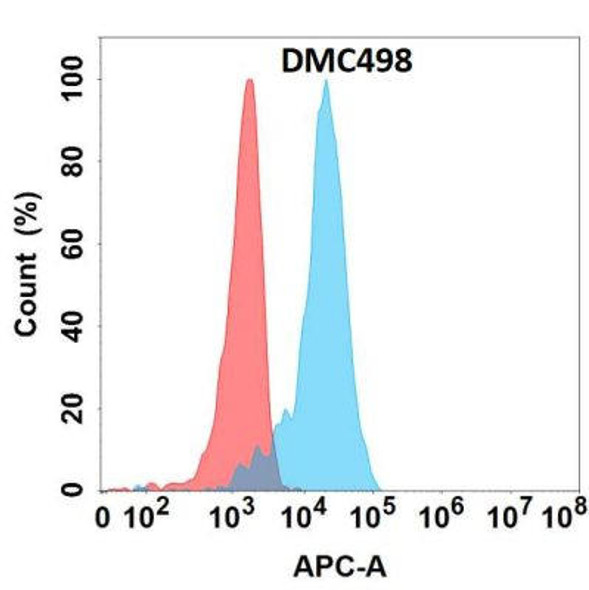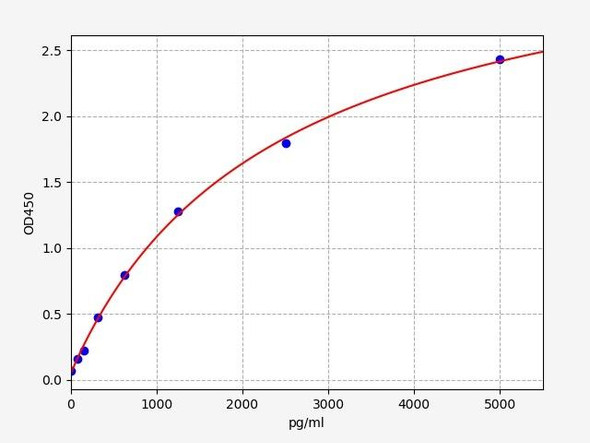Cell Biology Antibodies 5
Anti-GDNF Antibody (CAB14734)
- SKU:
- CAB14734
- Product Type:
- Antibody
- Reactivity:
- Human
- Host Species:
- Rabbit
- Isotype:
- IgG
- Antibody Type:
- Polyclonal Antibody
- Research Area:
- Cell Biology
Description
| Antibody Name: | Anti-GDNF Antibody |
| Antibody SKU: | CAB14734 |
| Antibody Size: | 20uL, 50uL, 100uL |
| Application: | WB |
| Reactivity: | Human |
| Host Species: | Rabbit |
| Immunogen: | Recombinant fusion protein containing a sequence corresponding to amino acids 109-211 of human GDNF (NP_000505.1). |
| Application: | WB |
| Recommended Dilution: | WB 1:500 - 1:2000 |
| Reactivity: | Human |
| Positive Samples: |
| Immunogen: | Recombinant fusion protein containing a sequence corresponding to amino acids 109-211 of human GDNF (NP_000505.1). |
| Purification Method: | Affinity purification |
| Storage Buffer: | Store at -20'C. Avoid freeze / thaw cycles. Buffer: PBS with 0.02% sodium azide, 50% glycerol, pH7.3. |
| Isotype: | IgG |
| Sequence: | RGQR GKNR GCVL TAIH LNVT DLGL GYET KEEL IFRY CSGS CDAA ETTY DKIL KNLS RNRR LVSD KVGQ ACCR PIAF DDDL SFLD DNLV YHIL RKHS AKRC GCI |
| Gene ID: | 2668 |
| Uniprot: | P39905 |
| Cellular Location: | Secreted |
| Calculated MW: | 18kDa/20kDa/22kDa/23kDa/25kDa |
| Observed MW: | Refer to figures |
| Synonyms: | GDNF, ATF, ATF1, ATF2, HFB1-GDNF, HSCR3 |
| Background: | This gene encodes a secreted ligand of the TGF-beta (transforming growth factor-beta) superfamily of proteins. Ligands of this family bind various TGF-beta receptors leading to recruitment and activation of SMAD family transcription factors that regulate gene expression. The encoded preproprotein is proteolytically processed to generate each subunit of the disulfide-linked homodimer. The recombinant form of this protein, a highly conserved neurotrophic factor, was shown to promote the survival and differentiation of dopaminergic neurons in culture, and was able to prevent apoptosis of motor neurons induced by axotomy. This protein is a ligand for the product of the RET (rearranged during transfection) protooncogene. Mutations in this gene may be associated with Hirschsprung disease and Tourette syndrome. This gene encodes multiple protein isoforms that may undergo similar proteolytic processing. |
| UniProt Protein Function: | GDNF: Neurotrophic factor that enhances survival and morphological differentiation of dopaminergic neurons and increases their high-affinity dopamine uptake. Defects in GDNF may be a cause of Hirschsprung disease type 3 (HSCR3). In association with mutations of RET gene, defects in GDNF may be involved in Hirschsprung disease. This genetic disorder of neural crest development is characterized by the absence of intramural ganglion cells in the hindgut, often resulting in intestinal obstruction. Defects in GDNF are a cause of congenital central hypoventilation syndrome (CCHS); also known as congenital failure of autonomic control or Ondine curse. CCHS is a rare disorder characterized by abnormal control of respiration in the absence of neuromuscular or lung disease, or an identifiable brain stem lesion. A deficiency in autonomic control of respiration results in inadequate or negligible ventilatory and arousal responses to hypercapnia and hypoxemia. Belongs to the TGF-beta family. GDNF subfamily. 5 isoforms of the human protein are produced by alternative splicing. |
| UniProt Protein Details: | Protein type:Secreted; Secreted, signal peptide Chromosomal Location of Human Ortholog: 5p13.1-p12 Cellular Component: extracellular region Molecular Function:protein homodimerization activity; growth factor activity; receptor binding Biological Process: positive regulation of dopamine secretion; axon guidance; nervous system development; peristalsis; adult locomotory behavior; mRNA stabilization; regulation of dopamine uptake; positive regulation of monooxygenase activity; signal transduction; enteric nervous system development; sympathetic nervous system development; ureteric bud branching; regulation of gene expression; induction of an organ; positive regulation of cell proliferation; postganglionic parasympathetic nervous system development; positive regulation of transcription from RNA polymerase II promoter; negative regulation of neuron apoptosis; positive regulation of cell differentiation; postsynaptic membrane organization; metanephros development; neural crest cell migration; neurite development; negative regulation of apoptosis Disease: Hirschsprung Disease, Susceptibility To, 3; Central Hypoventilation Syndrome, Congenital; Pheochromocytoma |
| NCBI Summary: | This gene encodes a highly conserved neurotrophic factor. The recombinant form of this protein was shown to promote the survival and differentiation of dopaminergic neurons in culture, and was able to prevent apoptosis of motor neurons induced by axotomy. The encoded protein is processed to a mature secreted form that exists as a homodimer. The mature form of the protein is a ligand for the product of the RET (rearranged during transfection) protooncogene. Multiple transcript variants encoding different isoforms have been found for this gene. Mutations in this gene may be associated with Hirschsprung disease. [provided by RefSeq, Jun 2010] |
| UniProt Code: | P39905 |
| NCBI GenInfo Identifier: | 729567 |
| NCBI Gene ID: | 2668 |
| NCBI Accession: | P39905.1 |
| UniProt Secondary Accession: | P39905,O95448, O95449, O95986, Q6FH33, Q96L44, Q9UD32 Q9UD33, Q9UMV2, Q9UP67, Q9UP97, B7WPK7, |
| UniProt Related Accession: | P39905,AAB33493,AAB33494 |
| Molecular Weight: | 18,123 Da |
| NCBI Full Name: | Glial cell line-derived neurotrophic factor |
| NCBI Synonym Full Names: | glial cell derived neurotrophic factor |
| NCBI Official Symbol: | GDNF |
| NCBI Official Synonym Symbols: | ATF1; ATF2; HSCR3; HFB1-GDNF |
| NCBI Protein Information: | glial cell line-derived neurotrophic factor; ATF; astrocyte-derived trophic factor |
| UniProt Protein Name: | Glial cell line-derived neurotrophic factor |
| UniProt Synonym Protein Names: | Astrocyte-derived trophic factor; ATF |
| Protein Family: | GDNF family receptor |
| UniProt Gene Name: | GDNF |
| UniProt Entry Name: | GDNF_HUMAN |






